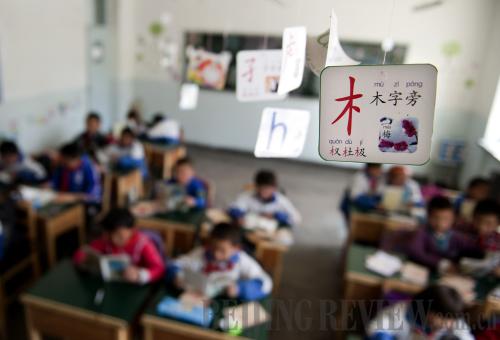|
 |
|
CROSS LANGUAGE BARRIER: Kazakh students learn Chinese at Dengcaogou Middle School in Urumqi County, Xinjiang Uygur Autonomous Region, on May 30, 2012 (WANG FEI) |
"It's snowing. It's snowing. On the snowfield are there little painters painting..." In a classroom at a school in Baishikante Township in northwest China's Xinjiang Uygur Autonomous Region, students are narrating a text in Chinese. Classes at this school are taught in both the Uygur language together with Mandarin Chinese. However, creating such a bilingual school wasn't easy, given the fact that it was built from an abandoned warehouse.
Starting from scratch
Baishikante is a typical Uygur settlement located 30 km from the Shache County seat in south Xinjiang's Kashgar Prefecture. It has taken Huang Ming nearly 20 years to establish his bilingual school in such a remote place.
In 1994, many local children had no access to education due to a critical shortage of teaching resources. Huang, who was teaching at a public school at that time, was determined to start bilingual classes after seeing that his friends' children were being kept from school. However, Huang met with difficulty at the start of his endeavor. Parents in the neighboring villages were not interested in bilingual education, so Huang had to personally visit families in order to recruit students. He finally found eight for his class.
Huang used a number of methods to enhance the education level, including having them listen to radio broadcasts. In 2000, all of Huang's eight students were admitted to the bilingual class at the No.2 Middle School in the county on account of their high test scores. After that, Huang's school became increasingly popular amongst local residents.
Huang is delighted by the fact that more and more parents from all over Shache and other places around Kashgar are enthusiastic about bilingual education and choose to send their children to his school. Now, the school has students coming from all 29 townships in the county, and even from other counties nearby.
Regeyan Ayoupu is a seventh grader from Alamaiti Township. Speaking in Mandarin, she said, "I couldn't speak any Chinese when I entered this school. Now Chinese is my best subject. I scored 92 on a recent test."
Working together
Bilingual education has been a government strategy since the Central Government's work conference on Xinjiang's development was held in 2010.
"We pursue bilingual education not with the intention to use one language to replace another but to help students master Mandarin Chinese together with their own native languages," said Nur Bekri, Chairman of the Xinjiang regional government. "Plus, they need to master a foreign language at school. This is significant to their personal development and for the whole nation."
"More and more ethnic minority students have benefited from bilingual education, and as such, bilingual education should begin early on," said Akotzguli, Vice Secretary of the Party Branch of the Beijing-based Minzu University of China's Preparatory Education College. The college's Xinjiang class has more than 50 students this year.
The quality of bilingual education concerns not only Xinjiang's overall development but also all the families that have tremendous expectations for their children.
"My gratitude is beyond words," said Mehmet Dawut, a farmer and father-of-four in Kepuqiai Village in Shache. With the exception of his eldest child who missed the opportunity for bilingual education, all his children studied in Huang's school. Currently, two of them are in college, and the youngest is studying at a preparatory class in a local middle school for students to study in schools in east China.
In 2001, Xinjiang set bilingual education as an important means for realizing its strategy for improving the overall education level of all ethnic minorities in the region.
Huang's dream of providing bilingual education have turned into reality because of government support. He has greater expectations for the future. "With a larger school and more students, we plan to recruit more bilingual teachers," he said.
| 